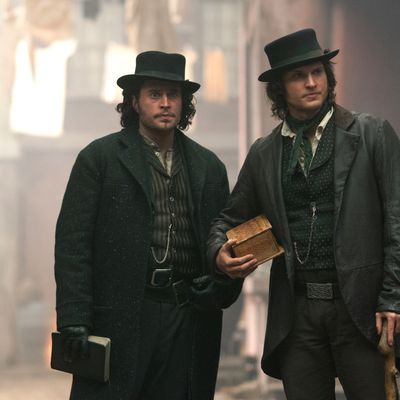
If the post-Civil War drama Copper (Sundays, 10 pm, BBC America), about Irish cops navigating every layer of circa 1865 New York society, were a tenth as good as it is ambitious, it would be 2012ÔÇÖs best new series. Its pedigree is strong: itÔÇÖs executive produced by MonsterÔÇÖs Ball writer Will Rokos, OzÔÇÖs Tom Fontana, and Barry Levinson, who worked with Fontana on Homicide: Life on the Street and directed some memorable period films (Diner, Avalon, Bugsy, et al). And its scale is ÔÇö or at least seems to be ÔÇö gigantic. Much of the show is set in and around Lower ManhattanÔÇÖs Five Points neighborhood, the stomping ground of Bill the Butcher in Martin ScorseseÔÇÖs Gangs of New York; it takes its stylistic cues from that picture and from Deadwood, McCabe and Mrs. Miller, and other down-and-dirty historical re-creations. It even has its own stylized vernacular. Why, then, is it so tedious?
Tom Weston-Jones stars as Kevin Corcoran, an incorruptible policeman and Civil War veteran wandering Five Points with his one-eyed pal Francis Maguire (Kevin Ryan), solving crimes while conducting an ongoing, mostly off-the-books investigation into the disappearance of KevinÔÇÖs wife and the murder of his daughter. The first two of episodes are classic ÔÇ£detective as errant knightÔÇØ material. Kevin and Francis and their fellow cops try to solve the murder of a child prostitute while protecting her straight-arrow sister from a similarly grim fate. Their investigation takes them up societyÔÇÖs ladder. The lower rungs include Eva┬áHeissen (Franka Potente of Run Lola Run), a brothel madam who supplies the cops with information and context and sometimes comforts the grieving Kevin; the prostitute Molly Stuart (Tanya Fischer), a squeeze of MaguireÔÇÖs who is fascinated by Kevin; freed slave, doctor and secret forensic scientist Matthew Freeman (Ato Essandoh) and his anxious, super-protective wife Sara (Veronica MarsÔÇÖs Tess Thompson), and KevinÔÇÖs nemesis┬áPadraic Byrnes (David Keeley), a corrupt cop whoÔÇÖs only loyal to his own appetites.┬á The higher social rungs include Elizabeth Haverford (Anastasia Griffith), a Fifth Avenue society lady who agitates for social change and helps the less fortunate, and KevinÔÇÖs old war buddy Robert Morehouse (Kyle Schmid), a raconteur and whoremonger who shares some of ElizabethÔÇÖs class-traitor impulses.
On paper, this seems a lively gallery of characters turned loose in a fascinating world. So why is Copper so uninteresting? LetÔÇÖs start with tone, which might be the most crucial aspect of TV storytelling. When a show hones a particular vibe and keeps it going ÔÇö when it tells you, ÔÇ£This is the showÔÇÖs view of life, the universe and everything, now settle in while we go for a rideÔÇØ ÔÇö it can make the entirety seem to cohere, even if scenes or whole episodes fall flat. A good show exudes confidence and then proceeds to earn it by rarely stepping wrong. I didnÔÇÖt believe much of what Copper showed me, alas, for several reasons. First, most of the performers speak in a thin, uninflected, distractingly modern-cadence. And when they attempt Irish or English or early-American accents, whether playing against their natural voice or not, I donÔÇÖt believe theyÔÇÖre 19th century people, at least not as easily as believed characters in productions that influenced it ÔÇö ripping yarns with performances that felt real and artificial, recognizable and indescribably alien. Copper is like a bunch of 21st century actors in period dress wandering expensive sets, reeling off exposition and historical footnotes gussied up with the odd verbal curlicue. (ÔÇ£Thoughtful men believe that urban growth can be controlled by scientific method and careful planning, though there are those who hold that the plight of the poor is their own doing,ÔÇØ Morehouse says at one point, as if vamping through a test he forgot to study for.) ┬á
If the actors were stronger ÔÇö or, to be fair, if the show had had a better sense of how to tap whatever talents they possess ÔÇö they might have been able to sell the material. No such luck. Weston-Jones is earnest and and handsome but not magnetic or dark enough to make the heroÔÇÖs righteous misery interesting, and the rest of the cast doesnÔÇÖt fare much better. Only Ato EssandohÔÇÖs performance rises above the level of a good try. That he happens to play the only character youÔÇÖve never seen before in a drama┬á surely helped, but I credit his aloof, watchful, focused quality. He pulls off that delicate actorÔÇÖs trick of revealing a characterÔÇÖs thoughts and feelings to the viewer while plausibly hiding them from other characters. He seems to have thought hard about how an African-American of FreemanÔÇÖs unique experience might react in any situation and found practical ways to translate his theories into performance. Watching him, you never feel that heÔÇÖs a contemporary man playing Civil War dress-up. He doesnÔÇÖt have a trace of 2012 consciousness, or even 1912 consciousness.
If only the whole series followed his lead. As a dramatic time machine, and even as historical soap, Copper is a well-meaning botch. It borrows from distinguished sources but doesnÔÇÖt alchemize them into something striking. Unless you have a jones for historical trivia or like playing spot-the-references, you can take the beat copÔÇÖs eternal mantra to heart: Move along, folks, thereÔÇÖs nothing to see here. ┬á


